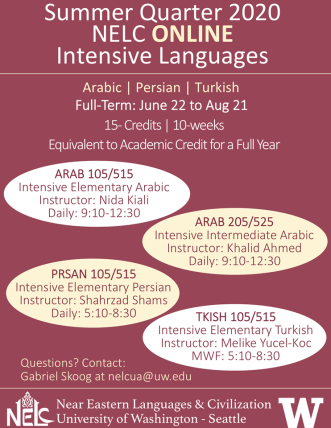Due to the unprecedented developments in the world, together with the rest of the UW community, the Department of Near Eastern Languages and Civilization shifted to online teaching very fast for the last week of Winter Quarter. NELC Faculty had less than two weeks to transform in-person course offerings into online for Spring 2020, which they did with great acuity.
Language classes, however, have unique challenges and opportunities when conducted entirely online. Our faculty continue to teach both ancient and modern languages by adopting new techniques and maximizing the potential of digital learning. Before the COVID-19 outbreak temporarily paused language classes at UW, our NELC language classes emphasized language learning through active participation and conversations between students. While it is possible to adjust lecture-style classes to Zoom with relative ease, the amount of student participation that language classes require necessitates some creativity. Therefore, language classes in the NELC department are including a larger variety of multimedia activities to provide students with more exposure to the languages they study. From Arabic to Hebrew, Persian, Turkic, and Turkish, our language professors incorporate movies, music, and cultural videos that allow students to engage with these languages despite the current quarantines.
To ensure that students still participate in classes, the language faculty utilizes both new and tested technological practices. By using breakout sessions in Zoom, uploading audio or video recordings to Canvas, and student practice and presentations via Zoom, faculty members encourage students to participate in class and thus better develop their language skills. The use of technology doesn’t stop at teaching modern Near Eastern languages as these tools are also used for Biblical Hebrew and Ge’ez classes this quarter.
The University of Washington’s administration decided that the Summer Quarter of 2020 will continue to function entirely online. This provides a unique opportunity for those who wish to study languages with us as you do not need to be in the Seattle area to enroll. No matter where you are in the world, you can join our summer intensive classes in Elementary and Intermediate Arabic, Elementary Turkish, and Elementary Persian.
Intensive Elementary Arabic lecturer Nida Kiali explains that “UW Summer Quarter offers students an accelerated method that enables them to learn First-Year Arabic (15 credits) in 9 weeks! In my class, we focus on Modern Standard Arabic (MSA) and the Levantine (Shami) dialect. Students learn essential vocabulary, syntax as well as important cultural aspects of the Arab World through fun activities. If you are looking to immerse yourself in Arabic, fulfill your language and VLPA requirements, then check out my course.”
Those a little more advanced in their Arabic journey can join Khalid Ahmed’s class for Intensive Intermediate Arabic. He notes “With more than 3 hours of daily practice and exposure to the Arabic language and culture, the summer intensive Arabic online course takes you virtually to the Arab world and allows you to explore aspects of its culture and history through songs, films and thematic language lessons.” Similarly, Turkish lecturer Melike Yucel-Koc, emphasizes that the summer classes, including her Intensive Elementary Turkish class, are extremely interactive and encourage task-based learning to maximize language growth in a short period of time. Shahrzad Shams is also offering a first-year Persian language course for the Summer Quarter.
Everyone from anywhere in the world is invited to join our intensive online language classes this summer. Whether you are a student who is interested in adding a major or minor in NELC, trying to gain a few extra VLPA credits, or are just interested in developing a new skill and unlocking a new culture, NELC’s summer language courses are designed and ready to provide a quality language experience remotely. As Khalid Ahmed says, “What you are not able to experience in person is brought to you in the convenience of your home.”
